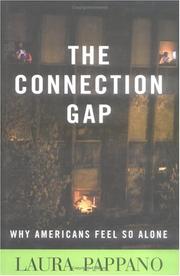| Listing 1 - 9 of 9 |
Sort by
|
Multi
ISBN: 9789051305697 Year: 2007 Publisher: Brussel Koning Boudewijnstichting
Abstract | Keywords | Export | Availability | Bookmark
 Loading...
Loading...Choose an application
- Reference Manager
- EndNote
- RefWorks (Direct export to RefWorks)
Book
ISBN: 2865864421 9782865864423 Year: 2003 Publisher: Ramonville Saint Agne: Érès,
Abstract | Keywords | Export | Availability | Bookmark
 Loading...
Loading...Choose an application
- Reference Manager
- EndNote
- RefWorks (Direct export to RefWorks)
Isolation [Social ] --- Isolement social --- Politiek [Sociale ] --- Sociaal isolement --- Sociale politiek --- Sociology of social care --- Community organization --- Social stratification --- Social problems --- Social isolation --- Poverty --- Social policy --- EXCLUSION SOCIALE --- REPRESENTATION SOCIALE --- INTEGRATION SOCIALE --- PAUVRETE --- POLITIQUE PUBLIQUE

ISBN: 0813529794 Year: 2001 Publisher: New Brunswick, NJ London Rutgers University Press
Abstract | Keywords | Export | Availability | Bookmark
 Loading...
Loading...Choose an application
- Reference Manager
- EndNote
- RefWorks (Direct export to RefWorks)
Sociology of culture --- Affective and dynamic functions --- Social psychology --- United States --- Alienation (Social psychology) --- Alienation [Social ] --- Aliénation (Psychologie sociale) --- Aliënatie (Sociale psychologie) --- Aliënatie [Sociale ] --- Disaffection (Social psychology) --- Eenzaamheid --- Estrangement (Social psychology) --- Isolation [Social ] --- Isolement --- Isolement social --- Loneliness --- Rebellen (Sociale psychologie) --- Rebelles (Psychologie sociale) --- Rebels (Social psychology) --- Seclusion --- Sociaal isolement --- Social alienation --- Social isolation --- Sociale aliënatie --- Sociale vervreemding --- Solitude --- Vervreemding [Sociale ] --- United States of America
Book
ISBN: 9782806601759 2806601754 Year: 2011 Volume: *1 Publisher: Fernelmont: Éd. modulaires européennes,
Abstract | Keywords | Export | Availability | Bookmark
 Loading...
Loading...Choose an application
- Reference Manager
- EndNote
- RefWorks (Direct export to RefWorks)
L’hospitalisation, avec la coupure radicale qu’elle entraîne par rapport à l’activité normale, familiale, professionnelle et sociale, est une situation à laquelle nous sommes tous probablement confrontés, un jour ou l’autre. Cette « coupure » souvent soudaine est, c’est l’évidence, fréquemment génératrice d’isolement du patient ou du résident qui se trouve confronté sans préparation à l’inactivité, au sentiment d’impuissance, à la souffrance, à la solitude et à l’angoisse que ces bouleversements provoquent sur une personne déjà blessée dans son intégrité physique par conséquent affaiblie physiquement et moralement... Puiser dans l’adversité une énergie nouvelle... Trouver en soi-même les ressources pour faire face à la détresse... C’est un beau programme, une résolution grandiose et exaltante... Mais il faut se résoudre à une constatation toute simple : les hommes, les femmes, vous et moi ne sommes pas nécessairement taillés dans le bois dont on fait des héros ! Et quand vient la détresse, le désir d’être entouré, assisté, écouté – non plus comme un malade mais comme un homme et une femme. Ce désir est un désir légitime, un droit qui doit pouvoir être satisfait. S’il est une matière dans laquelle les conceptions philosophiques et éthiques sont incontournables, c’est bien celle de l’assistance morale, religieuse ou philosophique : le respect du pluralisme des convictions exige absolument que les personnes isolées par le fait de l’hospitalisation (que cet isolement soit accidentel, passager ou chronique) puisse satisfaire naturellement, sans effort particulier, sans démarches contraignantes, leur désir de contact humain. C’est cet objectif que veut rencontrer Le soignant entre la vie et ses représentations. Les contacts nécessaires qui ont abouti à ce travail constituent déjà un fait important: le pluralisme ne peut être une concession de la pensée. Il est ce qui fait la richesse spirituelle de la démocratie.
Distress (Psychology) --- Détresse (Psychologie) --- Isolation [Social ] --- Isolement social --- Nood (Psychologie) --- Sociaal isolement --- Social isolation --- Hospital patients --- Hospital care --- Respect for persons --- Freedom of religion --- Hospitalisés --- Soins hospitaliers --- Respect des personnes --- Liberté religieuse --- Religious life --- Moral and ethical aspects --- Vie religieuse --- Aspect moral --- Hospitalisés --- Liberté religieuse
Book
ISBN: 9789049619534 Year: 2022 Publisher: Brugge Vanden Broele
Abstract | Keywords | Export | Availability | Bookmark
 Loading...
Loading...Choose an application
- Reference Manager
- EndNote
- RefWorks (Direct export to RefWorks)
Eenzaamheid is een brandend actueel thema. Niet alleen in de pers, maar ook in de wetenschappen is de aandacht voor eenzaamheid de laatste jaren alleen maar toegenomen. Aan de Vrije Universiteit Brussel ontstond begin de jaren 2000 het ouderenbehoefteonderzoek, dat sindsdien is uitgegroeid tot de maatstaf voor inclusief onderzoek naar de noden en behoeften van Vlaamse thuiswonende zestigplussers.In deze publicatie belichten auteurs Nico De Witte en Dominique Verté eenzaamheid bij ouderen in relatie tot sociodemografische indicatoren, wonen, de buurt, welzijn, fysieke en omgevingskwetsbaarheid, sociale contacten en pensionering. Hiervoor baseren ze zich op de gegevens van meer dan 82.000 ouderen verzameld in de periode 2004-2021. Het resultaat is een uniek inzicht in zowel de evolutie van de besproken kenmerken over de tijd heen, als in de al dan niet veranderende relatie met eenzaamheid.Dit boek biedt heel wat handvatten aan praktijkwerkers, beleidsmakers, studenten, onderzoekers en zorgprofessionals om aan de slag te gaan met het thema eenzaamheid bij ouderen.https://catalogus.vandenbroele.be/fondscatalogus/884.aspx?pageID=20050609124856Z
Oudere --- Ouderenzorg --- Eenzaamheid --- Behoefteonderzoek --- Sociaal isolement --- Wonen --- Wijk --- Welzijn --- Sociaal netwerk --- Pensionering --- Huisvesting --- Ouderen --- Ouderen. --- #SBIB:316.8H14 --- #SBIB:314H320 --- #SBIB:314H323 --- Welzijns- en sociale problemen: bejaarden --- Bevolkingsstudies: leeftijdsgroepen: ouderen: algemeen --- Bevolkingsstudies: leeftijdsgroepen: ouderen: gezondheid --- Eenzaamheid ; ouderen --- 665 Ouderen --- eenzaamheid --- ouderenzorg --- gerontologie --- ouderen --- onderzoek --- Geriatrics --- ouderenbeleid
Book
ISBN: 9789020986709 Year: 2010 Publisher: Leuven LannooCampus
Abstract | Keywords | Export | Availability | Bookmark
 Loading...
Loading...Choose an application
- Reference Manager
- EndNote
- RefWorks (Direct export to RefWorks)
In dit methodiekboek verkennen de auteurs hoe de basisschakelmethodiek de kloof tussen mensen in (kans)armoede en het bos van diensten en centra kan helpen overbruggen. De basisschakelmethodiek is een methodiek die in verschillende soorten organisaties ingebed raakte: buurtwerkingen, OCMW's, CAW's, Verenigingen waar Armen het woord nemen, wijkgezondheidscentra, inloopcentra, (Bron: covertekst)
Armoede. --- basisschakelmethodiek --- methoden van het sociaal werk --- armoedebestrijding --- Social welfare methods --- Armoede en hulpverlening --- Armoedebeleid ; Vlaanderen --- Poverty --- Belgium --- Prevention --- Basic needs --- Academic collection --- 666 Armoede --- 307.3 --- armoedebeleid --- buurtwerk --- kansarmoede --- methodiek --- Armoede --- Armoedebeleid/armoedebestrijding (sociaal impulsfonds) --- Kansarmoede --- 364.26 --- Armoedebestrijding --- Beleid --- Hulpverlening --- Methodiek --- 364.22 --- Armoede : hulpverlening --- S20100051.JPG --- welzijnswerk, methoden --- Sociologie van de welvaart --- 339.13 --- 339.1 --- 361.1 --- Uitsluiting --- Sociaal isolement --- Armoedebeleid --- Basisschakelmethodiek

ISBN: 9060322649 Year: 1985 Publisher: Amsterdam B.R. Grüner
Abstract | Keywords | Export | Availability | Bookmark
 Loading...
Loading...Choose an application
- Reference Manager
- EndNote
- RefWorks (Direct export to RefWorks)
Alienation (Social psychology) in literature --- Aliénation (Psychologie sociale) dans la littérature --- Aliënatie (Sociale psychologie) in de literatuur --- Aliënatie [Sociale ] in de literatuur --- Antihelden in de literatuur --- Antiheroes in literature --- Antihéros dans la littérature --- Isolation sociale dans la littérature --- Sociaal isolement in de literatuur --- Social isolation in literature --- Sociale aliënatie in de literatuur --- Sociale vervreemding in de literatuur --- Vervreemding [Sociale ] in de literatuur --- Victims in literature --- American fiction --- Roman américain --- Victimes dans la littérature --- Isolement social dans la littérature --- History and criticism --- Histoire et critique --- Roman américain --- Victimes dans la littérature --- Isolement social dans la littérature --- Aliénation (Psychologie sociale) dans la littérature --- Antihéros dans la littérature --- Hawthorne, Nathaniel --- Criticism and interpretation --- Melville, Herman --- Twain, Mark --- Lewis, Sinclair --- Bellow, Saul --- Dos Passos, John --- Steinbeck, John --- Crane, Stephen --- Hemingway, Ernest --- Jones, James --- Mailer, Norman

ISBN: 0691095558 0691002320 9786612087820 9786612935398 1282935399 1282087827 1400826675 9781400826674 9780691002323 9780691095554 9781282087828 9781282935396 Year: 2005 Publisher: Princeton, N.J. Princeton University Press
Abstract | Keywords | Export | Availability | Bookmark
 Loading...
Loading...Choose an application
- Reference Manager
- EndNote
- RefWorks (Direct export to RefWorks)
This book gives an ambitious revisionist account of the nineteenth-century British novel and its role in the complex historical process that ultimately gave rise to modern anthropology's concept of culture and its accredited researcher, the Participant Observer. Buzard reads the great nineteenth-century novels of Charles Dickens, Charlotte Brontë, George Eliot, and others as "metropolitan autoethnographies" that began to exercise and test the ethnographic imagination decades in advance of formal modern ethnography--and that did so while focusing on Western European rather than on distant Oriental subjects. Disorienting Fiction shows how English Victorian novels appropriated and anglicized an autoethnographic mode of fiction developed early in the nineteenth century by the Irish authors of the National Tale and, most influentially, by Walter Scott. Buzard demonstrates that whereas the fiction of these non-English British subjects devoted itself to describing and defending (but also inventing) the cultural autonomy of peripheral regions, the English novels that followed them worked to imagine limited and mappable versions of English or British culture in reaction against the potential evacuation of cultural distinctiveness threatened by Britain's own commercial and imperial expansion. These latter novels attempted to forestall the self-incurred liabilities of a nation whose unprecedented reach and power tempted it to universalize and export its own customs, to treat them as simply equivalent to a globally applicable civilization. For many Victorian novelists, a nation facing the prospect of being able to go and to exercise its influence just about anywhere in the world also faced the danger of turning itself into a cultural nowhere. The complex autoethnographic work of nineteenth-century British novels was thus a labor to disorient or de-globalize British national imaginings, and novelists mobilized and freighted with new significance some basic elements of prose narrative in their efforts to write British culture into being. Sure to provoke debate, this book offers a commanding reassessment of a major moment in the history of British literature.
Alienation (Social psychology) in literature --- Aliénation (Psychologie sociale) dans la littérature --- Aliënatie (Sociale psychologie) in de literatuur --- Aliënatie [Sociale ] in de literatuur --- British national characteristics in literature --- Brits volkskarakter in de literatuur --- Britse volksaard in de literatuur --- Caractéristiques nationales britanniques dans la littérature --- Culture dans la littérature --- Culture in literature --- Cultuur in de literatuur --- Difference (Psychology) in literature --- Differentie (Psychologie) in de literatuur --- Différence (Psychologie) dans la littérature --- Ik in de literatuur --- Isolation sociale dans la littérature --- Marginalen in de literatuur --- Marginaux dans la littérature --- Moi dans la littérature --- National characteristics [British ] in literature --- Outsiders in literature --- Self in literature --- Sociaal isolement in de literatuur --- Social isolation in literature --- Sociale aliënatie in de literatuur --- Sociale vervreemding in de literatuur --- Vervreemding [Sociale ] in de literatuur --- Volksaard [Britse ] in de literatuur --- Volkskarakter [Brits ] in de literatuur --- 820 "18" --- Engelse literatuur--19e eeuw. Periode 1800-1899 --- 820 "18" Engelse literatuur--19e eeuw. Periode 1800-1899 --- Soi dans la littérature --- Zelf in de literatuur --- English fiction --- National characteristics, British, in literature. --- Alienation (Social psychology) in literature. --- Difference (Psychology) in literature. --- Social isolation in literature. --- Outsiders in literature. --- Culture in literature. --- Self in literature. --- History and criticism. --- National characteristics, British, in literature --- History and criticism --- 19th century --- Love in literature
Book
ISBN: 9789401474825 Year: 2021 Publisher: Leuven LannooCampus
Abstract | Keywords | Export | Availability | Bookmark
 Loading...
Loading...Choose an application
- Reference Manager
- EndNote
- RefWorks (Direct export to RefWorks)
Thuiswerken: we hebben er een haat-liefdeverhouding mee. We houden van de vrijheid die thuiswerken biedt, maar missen de sociale contacten. We hebben minder last van stress, maar vinden het toch moeilijker om ons los te koppelen. Hoe zit het nou precies? Hoe kunnen we de nadelen aanpakken en de voordelen benutten?In Eerste hulp bij thuiswerken gidst psychologe Elke Van Hoof je doorheen dit 'nieuwe normaal'. Als leidinggevende leer je helder communiceren en engageren op afstand; als werknemer krijg je talloze tips aangereikt om thuis structuur en focus te vinden. En iedere lezer zal baat hebben bij de vele nuttige en ludieke suggesties, om de mentale uitdagingen van thuiswerk te lijf te gaan.Ten slotte werpen we een blik op de toekomst. Hoe kunnen we thuiswerk op een verantwoorde manier inzetten in een post-pandemische economie? En wat kan het verleden ons leren, zodat we niet overhaast te werk gaan?https://www.standaardboekhandel.be/p/ehbt-eerste-hulp-bij-thuiswerken-9789401474825
Telewerken --- Kantoororganisatie --- personeel --- 005.96 --- Telewerk --- Administratieve organisatie --- personeelsbeleid --- bedrijfscultuur --- telewerk --- psychologie --- ergonomie --- gestion du personnel --- gouvernance d'entreprise --- télétravail --- 097 Personeelsbeleid --- 131 Arbeidsrecht --- 450 Werkgelegenheid en arbeid --- 461 Bedrijfsleven --- 660 Welzijn --- Thuiswerk --- Sociology of work --- BPB9999 --- Stressmanagement --- Arbeidsvreugde --- Motivatie --- Eenzaamheid --- Sociaal isolement --- Virtuele meetings --- Veerkracht --- Leidinggeven --- Communicatietechnieken --- Vergadertechnieken --- Relatie gezin - werk --- Bemiddeling --- Online --- thuisarbeid --- telewerken --- BPB2106 --- thuiswerk --- werk op afstand --- travail à distance --- teilea-oibriú --- távmunka --- etätyö --- praca na odległość --- distancearbejde --- muncă la distanță --- teleworking --- телеобработка --- distansarbete --- lavoro a distanza --- работа на далечина --- delo na daljavo --- telexogħol --- trabajo a distancia --- kaugtöö --- rad na daljinu --- attālināts darbs --- εργασία εξ αποστάσεως --- teletrabalho --- Fernarbeit --- práca na diaľku --- рад на даљину --- práce na dálku --- nuotolinis darbas --- punë në distancë --- elektronische Heimarbeit --- kodus töötamine --- attālināta nodarbošanās --- telelavoro --- работа на далечина со користење телекомуникациски средства --- teileachomaitéireacht --- diaľková práca --- telecommuting --- kotipäätetyöskentely --- Tele-Arbeit --- telemuncă --- telemunka --- rad na daljinu uz korištenje telekomunikacijskih sredstava --- muncă prin transmitere la distanță a informațiilor --- teletrabajo --- punë me anë të mjeteve të telekomunikacionit --- trabalho à distância --- τηλεργασία --- distansarbetare --- hjemmeterminalarbejde --- decentrale werkorganisatie --- të punuarit në distancë --- работење на далечина --- distance working --- tālsakaru darbs --- Telearbeit --- kodutöö --- работа од дома --- lavoro a domicilio --- trabajo a domicilio --- trabalho no domicílio --- εργασία κατ' οίκον --- delo na domu --- práce doma --- home working --- рад код куће --- práca doma --- të punuarit nga shtëpia --- travail à domicile --- darbs mājās --- hjemmearbejde --- rad kod kuće --- muncă la domiciliu --- домашна работа --- hemarbete --- praca w domu --- xogħol mid-dar --- darbas namie --- otthoni munka --- Heimarbeit --- kotona työskentely --- hemarbetare --- kotona työskentelevä --- darbas namuose --- trabajador a domicilio --- работење дома --- mājstrādnieks --- dirbantis namuose --- home worker --- kodutöötaja --- otthon végzett munka --- lucrător la domiciliu --- namudinis darbas --- háztartási munka --- travailleur à domicile --- pracujúci doma --- punonjës shtëpie --- lavoratore a domicilio --- namudininkas --- εργαζόμενος κατ' οίκον --- working from home --- mājās strādājošais --- trabalhador no domicílio --- thuiswerker --- mājražotājs --- Heimarbeiter --- Télétravail Telewerken --- Veerkracht (fysica) --- Leiderschap --- Communicatietechniek --- Werk-privébalans --- Veerkracht (weerbaarheid) --- obair ón mbaile --- Homework
| Listing 1 - 9 of 9 |
Sort by
|

 Search
Search Feedback
Feedback About UniCat
About UniCat  Help
Help News
News